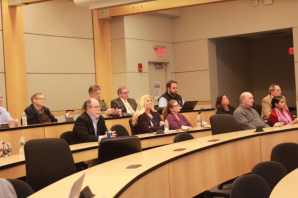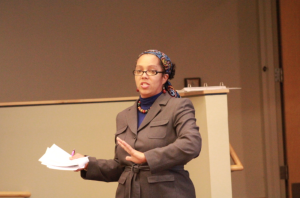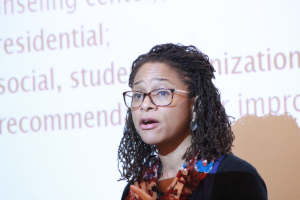According to the Merriam-Webster dictionary, a microaggression is a comment or action that subtly and often unconsciously or unintentionally expresses a prejudiced attitude toward a member of a marginalized group.
Microaggressions are a flourishing problem within our society today and the first thing civilians must do is to make themselves more aware that they are being used in their day-to-day lives.
The racial climate on campus is an issue being discussed on campus, both because this is a universal issue but also as a result of on-campus racism.
On Thursday, Nov. 10 a faculty forum was held that talked about the issue and had presentations by Dr. Angela Campbell, Dr. Maya Gordon and Dr. Paul Wright. The forum discussed inclusivity in classes.

Gordon and Campbell gave a presentation together about the racial climate on campus. Both Gordon and Campbell received a summer grant last year to study the racial climate and the inclusivity on campus. During the presentation, they explained how minorities need more of a presence in higher positions.
Minorities on campus do not usually see people who look like them in high-status positions around campus. They usually see them as groundsmen, housekeeping or working in the cafeteria. While those jobs are not bad, the students need someone who looks like them in the classroom as well.
Some students feel better when they have someone who looks like them to talk to. In some cases, professors of different races can understand but they cannot relate to how the student is feeling.

“We are all constantly working to bring the best instruction to our students and an essential element of that is the awareness of and response to the need for inclusivity in our classrooms while working to understand its effects on our racial climate,” Dr. John Cordes, communication professor, said.
The students of Cabrini University should not feel unsafe at a place they call home. After the horrific act of hatred happened earlier this semester, there were many students who did not feel safe and felt excluded.
Dr. Joseph Fitzgerald, history and political science professor, thinks that students want professors to better facilitate and moderate conversations about racism.
“Many Americans don’t want racism around, so that means we’re working to end it at Cabrini and in the rest of America,” Fitzgerald said.
This act was not taken lightly by the Cabrini community.
“The Faculty Forum was an important and well-received step in this ongoing process,” Cordes said.

The presentation was aimed at explaining the microaggressions that are used towards others.
“The work that we are doing is not about fear, guilt or shame. We are all inheritors of a world. We live in this world in a particular place in the social order but, depending on where we fall in that order, our lives are vastly different experientially,” Campbell said.




To choosing to go to a social justice university is a commitment and lifestyle. Some people chose to attend Cabrini because of their parents thought it would be the best choice. Students wanted a reaction and that is what they got it. They know how sensitive people are.
Some people want to do things believed to be funny among their peers and forget about the unity that makes community.
The stems to racism is the separation created by race itself. Classification has developed into what some horribly take advantage of using (classism). The ill “ism’s.”